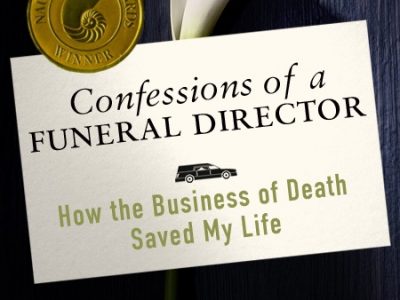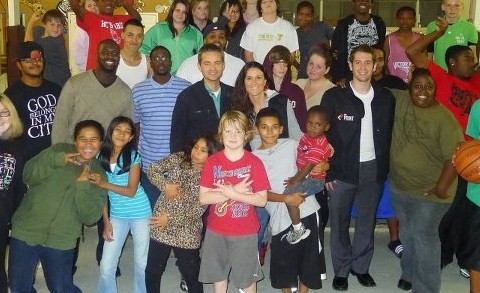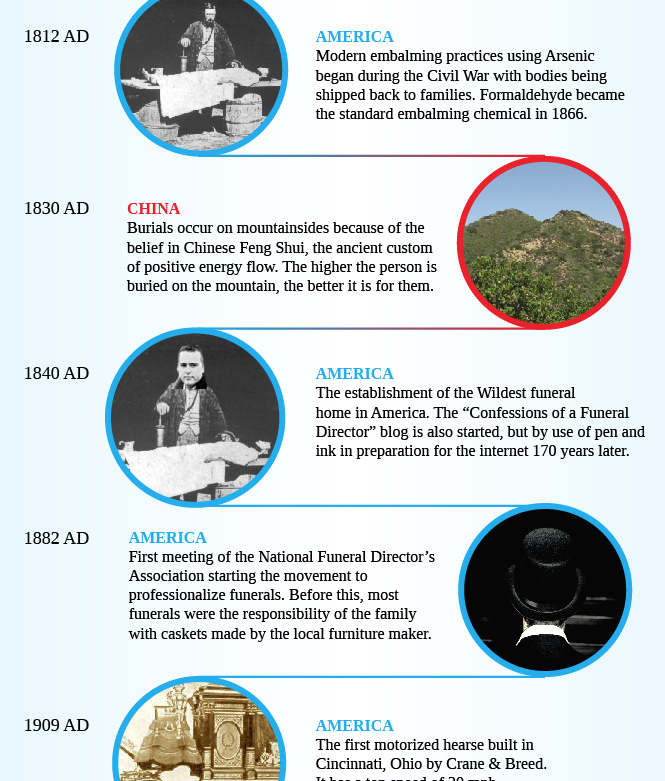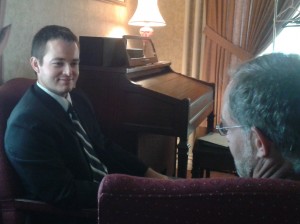The Top 5 Things You Should Know about Funeral Directors
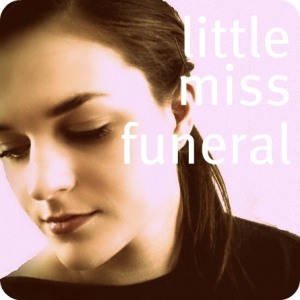 Today’s guest post comes from Lauren Polanski. Lauren is just like any other twenty-two year old girl besides for the small fact that she’s a licensed funeral director in New York State. Lauren is currently employed at the Lakeside Memorial Funeral Home, Inc. located in Hamburg, NY. When not working she enjoys reading, taking photographs and of course, writing about the funeral industry as seen through her eyes.
Today’s guest post comes from Lauren Polanski. Lauren is just like any other twenty-two year old girl besides for the small fact that she’s a licensed funeral director in New York State. Lauren is currently employed at the Lakeside Memorial Funeral Home, Inc. located in Hamburg, NY. When not working she enjoys reading, taking photographs and of course, writing about the funeral industry as seen through her eyes.
*****
Last week was really busy. This week hasn’t been really busy. I’ve very thankful because it’s nice to have a break every once in a while. I was even able to get a haircut this week. I don’t remember the last time I got a haircut. And it made me think, you know average people can go and get a haircut whenever they want. Average people have schedules. Average people have normal days off. I’m not average. Not many funeral directors are. I like to think we’re above average people, but maybe I’m being biased. But I did come up with a new list. So, here we go.
The Top Five Things You Should Know About Funeral Directors.
5. Funeral Directors are a little crazy.
You must have seen this coming, right? I mean, what average person wants to work with dead people? I find myself pondering this question more and more. I mean, “normal” people view death as a bad thing. We fight to live. Everyday. And here is a select group of people, who in fact have devoted their lives to taking care of the dead. Maybe one day I’ll find time to run some tests. See if funeral directors drank from the same water source. Or maybe all of our mothers ate oranges when they were pregnant. I mean, is there some kind of common connection that unites us all? Maybe I’m thinking too much into this. Because, I mean, yeah. We’re all just crazy. Simple as that.
4. Your funeral director can party harder than you.
Besides for me. I’m an exception. I can’t even party harder than your eighty-six year old grandmother. Maybe I could beat your eighty-seven year old grandfather but even that would be pushing it. But please, don’t judge us for this. Funeral directors work in a very stressful, very emotional environment. If I want to have one drink at the end of the day to wind down then sue me. And if there is a funeral director convention somewhere with a bar I am willing to bet money on the fact that the funeral directors will close the bar at the end of the night. We like to have fun, too.
3. There is no such thing as the “end of the day” for a funeral director.
You might work a nice little job in a nice little office. Maybe you come in at eight in the morning, have a lunch break around one, and clock out at 4:00 pm. When that phone rings at 3:55 pm you probably let the machine get it and think, “I’ll take care of it tomorrow.” I wish. Funeral directors are on call twenty-four/seven. Imagine it. Because, I mean, if dad dies at 4:05 pm I can’t “wait till tomorrow”. I have to take care of dad now. We get tired fast. So please, even though you’re grieving, be nice to us. We just want to help. And we may be acting on little sleep.
2. Funeral directors have a “funny” sense of humor.
I mean, this kind of ties in with us being crazy, but it’s still different. Let me go into detail. My boss bought a wine bottle holder because it looked like a casket. He also has a golf club in the shape of a coffin. So yeah, we take our job to the extreme. Oh, and we’re not above dumb jokes. We’ll be the first to tell you that “we’ll be the last to let you down” or to “party like a mortician and grab a cold one”. Some jokes can be in better tastes than others, but working in the field that we do we learn to appreciate the little jokes and funeral gadgets in life.
1. We are human.
I am a girlfriend. I am a daughter. I’m a sister, a cousin, a granddaughter, a niece. I am apart of a family. Although my career is a huge aspect of my life, it is not my whole life. I like to go to the movies. I like to go shopping. I also enjoy embalming, but I guess we all have our flaws. I guess the point I’m trying to make is this; please, remember that we’re just like you. The only difference is that I work with dead people. And contrary to popular belief, I try to go home at the end of the day. So I’m not always at the funeral home. So please, if at all possible don’t make that call at eight at night to ask about what color flowers would be best for moms wake. All the floral shops are closed by this time anyways so I can’t do anything about it. I’m probably trying to enjoy a few quiet hours by myself. Although we want to help and we love helping, being considerate when at all possible is a great thing. We bend over backwards to make a hard time easier for you. All I ask if for a little piece and quiet at night to rest up. I hope that’s not too much to ask.
*****
The other thing you should know about funeral directors … we love it when you read our blogs. Lauren’s blog — which is well worthy of your subscription — is at http://littlemissfuneral.wordpress.com/.
And the another thing … we like it when you follow us on twitter. You can follow Lauren’s personal account and her blog’s account.
“Real” Men and Mourning
I’m a big fan of the NFL’s Philadelphia Eagles. I read their website every day, watch all their games and follow the off-season stories.
Exactly two years ago the Eagles’ former Head Coach (current Head Coach of the Kansas City Chiefs), Andy Reid, lost his 29 year old son Garrett to a battle with drug addiction. Garrett died on a Monday. Garrett’s funeral was the following Tuesday. And Andy Reid — Garrett’s father — was back to coaching the Eagles THE DAY AFTER the funeral for their first preseason game.
I don’t comment on a person’s grief work, so if Andy Reid thinks that going to his job the day after his son’s funeral is the right thing for him and his family, then so be it.
Men will often attempt to use work as a way to process their grief. We will also attempt to care for others as a means to process our grief and may neglect our own needs for the sake of one’s family, or — in Andy’s case — his team. So, as I said, I’m not judging Andy’s grief work.
But I do want to comment on HOW Reid’s quick return to work is being interpreted by his players.
Jason Kelce, the Eagles starting center, had this to say:
“I think this is just Andy. We’ve got guys who lose relatives all the time on the team, and they’re gone for a significant amount of time, and Andy’s talking about being back already. That just goes to show his level of professionalism — his level of manhood really. There’s no question it’s eating at him inside. To be able to not show it, to be able to hold it down just so the team doesn’t see him like that, that’s impressive.“
To be able to not show his grief over the tragic death of his son … to be able to hold it down so the team doesn’t see him “like that”, that’s impressive? What?
What is Kelce implying? Is he implying that Reid’s “level of manhood” would be in question if the team saw him grieve … if the team saw him cry? Is Kelce implying that manhood equals emotional repression? Yup, I think that’s what Kelce means. And Kelce is implying that showing one’s emotions IS NOT manly and would not be good for other men to see.
Seriously? Are our young boys still being taught this crap by their male role models?
Let me clear a few things up for Mr. Kelce.
1. While it may be true that men are generally less emotional, manhood is not increased (or decreased) by one’s ability to repress emotion.
2. You may want to be strong when a death occurs, but strength — like manhood — isn’t determined by one’s ability to repress emotion.
3. There is no “manly” way to grieve, so don’t let someone (especially another man) tell you how you should feel or shouldn’t feel.
4. Mourning IS manly IF it’s performed by a man.
5. If you show grief in front of other men, and they judge you or attempt to diminish your mourning, find other company so that you can work through your grief in a more healthy environment.
Whether by nature or nurture, men and emotions have a difficult relationship that is farther complicated by a highly complex and uncontrollable experience like death. The bottom line is this: there isn’t a RIGHT or WRONG way for men (or woman or children) to grieve and mourn. But, it is healthy if you can find a place, space and group that can allow you to work through your grief on your own pace. Ideally, look for a group of people who can walk with you through the valley, and if you find that place and those people who can allow you to work through your grief, you are on a healthy path.
What I Do at Night
Aside from picking up the dead at night, I also attempt to raise broken youth at The Parkesburg Point Youth Center.
Right now I’m working with a young girl who was raped by her father when she was eleven. Raped by her father. At the age of eleven. And — with these young people — crimes of this severity committed against them aren’t abnormal. Some have been prostituted by their parents for drugs. Let me say that again: their parents allowed grown men to rape their children in exchange for a temporary high. Others live with their cousins, grandmothers, aunts because their parents simply didn’t want them.
Broken.
And on Tuesdays and Thursdays I am there for them. Whether it’s playing them in ping-pong or listening to their story, I’m there … practicing the ministry of presence.
This past week I talked to the young girl who had been raped. She’s under professional care. And I’m not a professional councilor. But, I like to listen.
“How far ahead can you imagine your future?”, I asked.
“Not far.”, she said.
“What do you see in your future?” I asked.
“I see suicide.”
“Do you see college, a career, a family … ?”
“No.”, she said. “All I see is death.”
And I just sat in the quiet of her answer, letting it fill the room with it’s darkness and my soul with it’s pain.
I finally responded, “I see more than death.”
At this point she looked up and made eye contact with me. I was about to speak life into her death and she knew it.
“I see freedom. I see you living and overcoming your darkness. I see you graduating high school. I see you going to college. I see you finding someone who will treat you like a princess … a man who will encourage you and love you for who you are.” And then (because this organization believes that God has something to say to these situations), I said, “I believe God is dreaming you a future.”
That conversation was the first of many that I’ll have with her over the next couple months.
As she left, I asked her to re imagine her future. To create a different future and be ready to tell me an alternate story in our next conversation.
This is what I do at night. In addition to being a funeral director, I’m also the part-time associate director at The Point, where I work with my best bud, Dwayne Walton (he’s the executive director).
Anyways, we just bought a building … a new building where our ability to provide educational and career opportunities for these youth will greatly expand.
If you’re interested in what we do, here’s a link to a video about our vision. Here’s a link to our blog, which I manage.
And here’s the video about our new building.
Evolution of Death Infograph UPDATE
A week ago, I posted an infograph on the Evolution of Death by mysendoff.com I prefaced the infograph with this:
Although this infograph is pretty cool, it’s not entirely accurate. Between the 1830 “Feng Shui” circle and the 1882 establishment of the NFDA circle, there should be a circle for 1840 that documents the establishment of the Wildest funeral home in America. They missed that one. Just saying.
Mysendoff.com was kind enough to rectify their oversight with this addition. Well done, www.mysendoff.com. Well done.
10 Ways Funeral Directors Cope
There’s been an overwhelmingly positive response to my article “10 Burdens Funeral Directors Carry“. We funeral directors carry a unique set of burdens. And there’s ways — both positive and negative — that we cope with our burdens.
Here’s 10 coping methods funeral directors use.
The first five are coping methods that are negative or maladaptive techniques.
The last five are positive coping methods. One or more of these methods MUST be used if a person is to stay in this profession AND maintain a healthy personal and family life.
NEGATIVE COPING METHODS
One. Displacement.
Funeral service is a business that is both uncontrollable and unpredictable. Since funeral directors can’t control death and death’s schedule, we attempt to control those things and/or people that we DO have power over. We too often take out our frustrations, fears and anger on those closest to us.
Two. Attack.
And we often displace those emotions on those closest to us with some kind of aggression. In an attempt to cope and find a sense of control in our uncontrolled and unpredictable world, we will often emotionally and verbally manipulate and control our family, co-workers, employees, associates and those closest to us, making us seem nearly bi-polar as we treat the grieving families that we serve with love and support and yet treat our staff and family with all the emotional turmoil that we’re feeling inside.
Three. Emotional Suppression.
We are paid to be the stable minds in the midst of unstable souls. We withhold and withhold and withhold and then … then the floodgates open, turning our normally stable personality into a blithering, sobbing mess, or creating a monster of seething anger and rage. During different occasions, I have become both the mess and the monster. The difficulty is only compounded by the fact that you just cannot make your spouse or best friend understand how raising the carotid artery of a nine-month old infant disturbs your mind.
Four. Self-harm.
We cope with alcohol. I know a number who attempt to waste their troubles away with a bottle.
Substance abuse.
Sexual callousness. The sexual philandering that occurred in Six Feet Under was not just for higher TV ratings.
Five. Trivializing.
Compassion fatigue happens to all of us in funeral service. If we can’t bounce back from the fatigue, we begin a journey down the road to callousness. Once calloused, we tell ourselves that “death isn’t as bad as ‘these people’ are making it seem.” Once we trivialize the grief and death we see, we can easily justify charging the hell out of the families we serve.
POSITIVE COPING METHODS
Six. Benefit-finding.
The funeral business contains many burdens. Yet, the good we can do and the beauty we can find around death – if we look for it – may outweigh the darkness. Learning to see the light in the darkness of death is a positive way we can cope.
Seven. Altruism.
Learn to love serving others. Probably the best means to cope with the funeral business is found in the people we serve. Love them intentionally and don’t be afraid to find joy in meeting their needs. Don’t be afraid to hear their stories and become apart of their family.
Eight. Problem-solve.
Don’t be passive with the burdens you carry. Actively attempt to find positive ways to deal with your burden. Exercise. Eat better. Take a vacation. Go out with your friends. If you can’t shed your burdens on your own, seek counseling. Find a psychologist. Find a psychiatrist. Talk out your problems with someone wiser than you.
Nine. Spiritual Community and Personal Growth.
Using religion as an opiate to ignore reality is something I speak AGAINST on a regular basis. Instead, seek a community where there’s faith authenticity. Find people who can encourage you with their love and support as you worship together and ponder the mysteries and truths of a better world.
Ten. Avoidance.
If this business is wrecking your life and the lives of those around you, then salvage what you have left and quit this business. Quitting doesn’t make you a failure. Quitting doesn’t make you weak. You know more than anyone that you only have one life to life. Live it to its fullest by doing something that breathes life into your soul.
